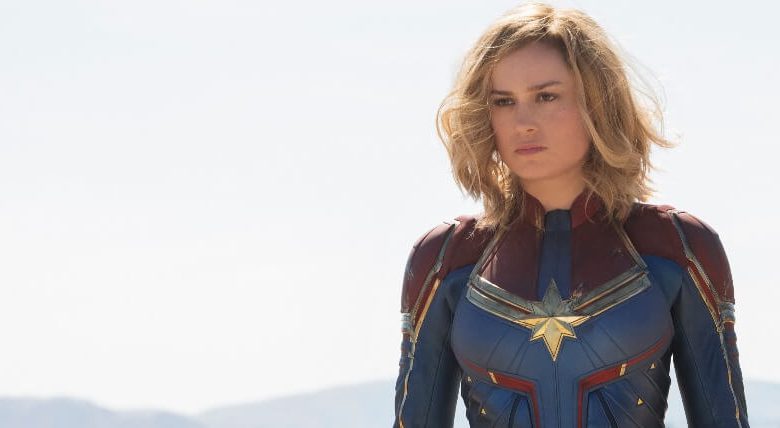The Big Lie Behind ‘Captain Marvel’s’ Feminist Fight

The battle over “Captain Marvel” began well before its March 8 release date.
The first female-led MCU feature since the franchise transformed Hollywood stars Brie Larson as the colorfully clad hero.
That’s “Her”-“o,” to be precise.
The film’s marketing team played up the feminist angle, knowing that Hollywood reporters would take the bait.
Larson did the rest. She bounced from interview to interview, talking up the film’s feminist bona fides. She insisted only certain reporters got the chance to pepper her with softball questions. It also didn’t escape savvy film fans how, last year, Larson insisted white male reviewers were the wrong choice to opine on “A Wrinkle in Time.”
Why?
The film’s lead was biracial, and the director a woman of color (Ava duVernay of “Selma” fame). The film wasn’t “meant for them.”
Add it all together and plenty of folks claim they’ll pass on “Captain Marvel.” Said folks are mostly white and male, the souls alienated by Larson’s divisive rhetoric. And that’s a problem for outlets like liberal Daily Beast.
A movie like Captain Marvel, starring a pretty young woman who doesn’t care to make her opinions palatable to men, about a character more powerful than any in the MCU, was never going to sit well with the kind of superhero fan who’d tell a woman to smile more.
Is The Daily Beast right? Let’s take a look at the film which beat “Captain Marvel” to the finish line. Two years ago, DC Comic unleashed “Wonder Woman.” The film marked the first major female-led super saga of modern times. Yes, we’ve previously seen “Supergirl,” “Catwoman” and “Red Sonja,” among others.
Still, “Wonder Woman” hit theaters at the peak of our Comic-Con obsession.
So what happened next? Did the film’s star, Gal Gadot, transform into Gloria Steinem during her press tour? Did DC Comics or Warner Bros., the studio behind the film, play the Gender Card in their 
Did white male fans care that her character could whup Batman in a fight?
No.
The film simply wowed critics, made Gadot an A-list star and paved the way for a sequel. And nary a “troll” or “man-child” huffed and puffed about its existence or success. It’s likely some did, but hardly in the kind of numbers that would be seen on pop culture radar screens.
Hmmm.
Those same trolls and man-children also stood down when female-led action films like “Peppermint,” “Miss Bala,” “Alita: Battle Angel” and “Atomic Blonde” (based on a graphic novel) hit theaters. No protests. No outcries that only men should be vigilantes and action heroes.
There’s more:
Talk of a solo Black Widow feature starring Scarlett Johansson has similarly earned little online outrage.
Clearly, “Captain Marvel” is different. The film’s team, from its star to the marketing gurus, are purposely stoking the culture wars. See our movie or you’re not woke. Object to our movie and you hate women. This isn’t Escapism 101, as previous MCU outings provided. It’s time to learn about gender inequality.
Seems an odd marketing ploy. Just ask the “Lady” Ghostbusters.
The all-female reboot of the beloved franchise followed the “Captain Marvel” blueprint. Embrace the film’s gender play. Declare how vital it is for young girls to have female Ghostbuster role models. Denounce anyone aghast at the casting choices to be a hater, or worse.
Guess what happened next?
“Ghostbusters” underperformed. The film cracked the $100 million mark at the U.S. box office, normally a sure sign of success. That wasn’t enough. The film’s bloated budget negated those figures. Multiple news outlets estimated “Ghostbusters” cost Sony $70 million. The rebooted franchise stalled before the son of the original film’s director, Jason Reitman, announced late last year he’s directing a new “Ghostbusters” sans the “Ladies.”
RELATED: How the Lady ‘Ghostbusters’ Exposed Blatant Media Bias
It’s clear the film’s antagonistic approach to its core audiences didn’t help the film’s bottom line. Will the same happen to “Captain Marvel?”
Probably not, at least at first.
The MCU brand is as strong as any film property in 2019. The franchise’s string of hits, including “Black Panther,” “Doctor Strange,” “Ant Man and the Wasp” and “Avengers: Infinity War” is enough to coax viewers to see “Captain Marvel.”
It’s both review and woke proof. What happens next?
Movies like “Captain Marvel” can’t simply crush the $100 million box office barrier. They need to make double that, at the very least, while delivering overseas, too.
That’s where the woke “Captain Marvel” posture could come into play. That, and that fact that even some female critics agree the film is a dud means all the lecturing in the world may not be enough.
CAPTAIN MARVEL is just another superhero movie, and not a particularly good one at that.
(deep sigh) my review: https://t.co/Fekqzc7nAQ pic.twitter.com/HgzKXC0Ynn
— david ehrlich (@davidehrlich) March 5, 2019
There’s a harder lesson for the MCU. Woke politics transformed the beloved “Star Wars” franchise into a culture war victim. “The Last Jedi” didn’t obliterate the box office as expected. “Solo: A Star Wars Story” dramatically underperformed.
Longtime fans saw politically correct robots, Mary Sue figures and class warfare shtick and said, “Where’s the ‘Star Wars’ I know and love?”
Suddenly, the ninth installment in the saga isn’t a sure box office thing. It’ll make money, no doubt, but likely won’t touch what “The Force Awakens” hauled in four years ago.
“Captain Marvel” may, too, make a mint despite the anti-marketing campaign. Maybe several. The damage to the MCU brand may still be considerable.
